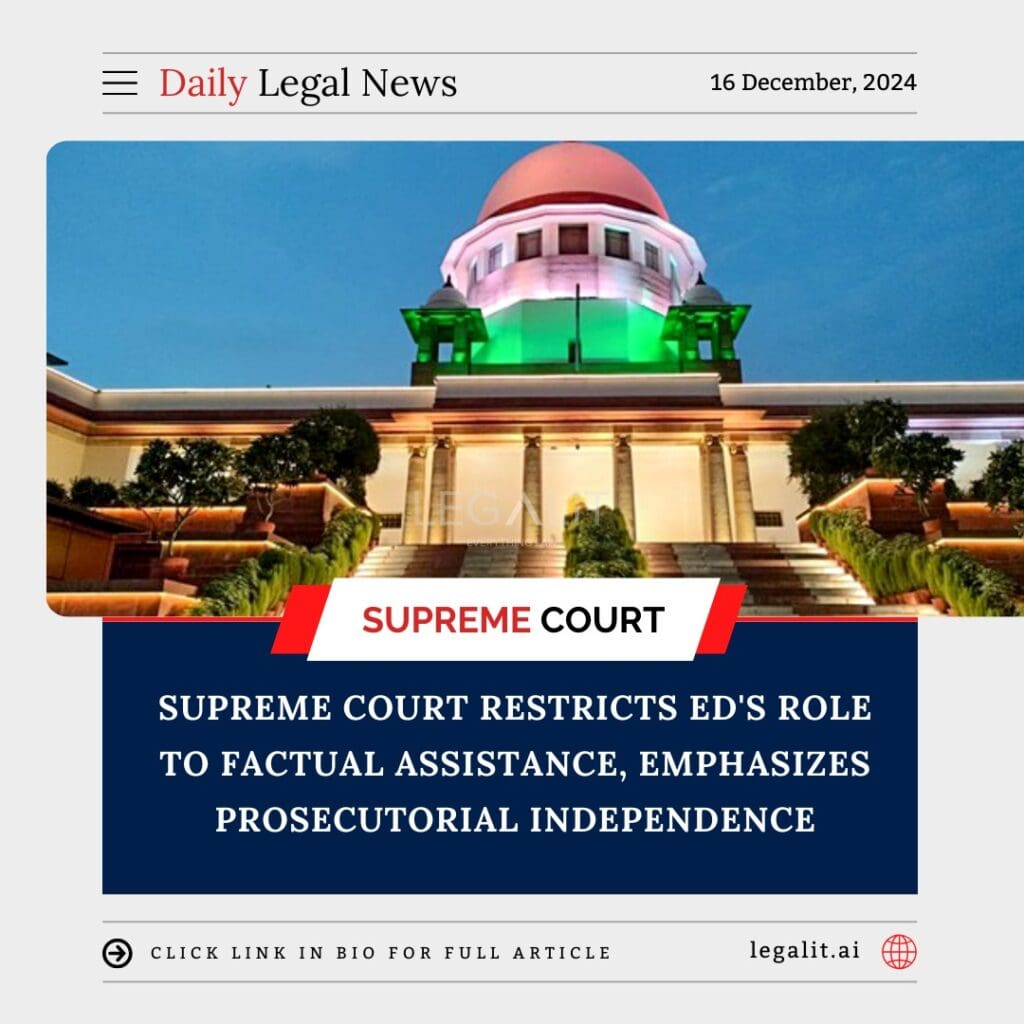
The Supreme Court of India recently clarified the boundaries of the Enforcement Directorate’s (ED) role in judicial proceedings, ruling that the agency is limited to furnishing factual information to public prosecutors and cannot dictate the arguments or legal strategies they present in court. The judgment seeks to safeguard the independence of public prosecutors and ensure the impartiality of court proceedings.
Background:
The controversy stemmed from allegations that the ED was attempting to exert undue influence over public prosecutors by directing them on how to present arguments in specific cases. Public prosecutors are meant to act as impartial officers of the court, responsible for presenting evidence and legal arguments based on facts, without succumbing to external pressures. Concerns were raised that such interference could disrupt the fairness of trials and blur the distinct roles of investigative and prosecutorial bodies.
This issue came to light in the context of high-profile cases involving money laundering and economic offenses, where the ED, as the investigative body, reportedly sought to control the courtroom narrative through prosecutors. Critics argued that this overreach could potentially compromise the principles of justice and fairness, which underpin the judicial system.
Court’s Rationale:
The Supreme Court bench strongly emphasized the distinction between the roles of investigative agencies and public prosecutors. It stated that while the ED is authorized to collect and present factual evidence related to an investigation, the responsibility for interpreting and arguing the case lies solely with the public prosecutor. The court highlighted that prosecutors, as officers of the court, owe their allegiance to the judicial system and must act independently to ensure justice.
The bench further observed that permitting investigative agencies to influence the arguments made in court could undermine the credibility of the judiciary and create a perception of bias. The judgment reaffirmed the principle that prosecutors must exercise their discretion in assessing evidence and crafting legal arguments, free from external interference, to preserve the sanctity of the judicial process.
Existing Measures:
India’s legal framework clearly delineates the roles and responsibilities of investigative agencies and prosecutors. Under existing laws, prosecutors are entrusted with the responsibility of representing the state in criminal cases and ensuring that trials are conducted fairly. Investigative agencies, such as the ED, are tasked with gathering evidence and presenting it to the court.
The court noted that this separation of duties is critical to maintaining the integrity of the legal process. It also pointed out that the independence of public prosecutors is protected under various legal provisions to prevent any undue influence that might affect the fairness of trials. The judgment serves as a reminder of the need to adhere to these principles to uphold public trust in the judicial system.
Implications of the Ruling:
The Supreme Court’s decision carries significant implications for the functioning of investigative agencies and the judiciary. By reiterating the limited scope of the ED’s role, the judgment seeks to prevent any encroachment on the autonomy of public prosecutors. It also sends a clear message that the judiciary will not tolerate any actions that might compromise the independence or impartiality of court proceedings.
The ruling is particularly relevant in the context of complex economic offenses and money laundering cases, where investigative agencies often play a pivotal role in collecting evidence.. It ensures that the presentation of cases in court remains free from any undue influence, thereby safeguarding the rights of the accused and reinforcing the principles of justice.
Conclusion:
The Supreme Court’s judgment underscores the importance of maintaining a clear separation between the roles of investigative agencies and public prosecutors. By limiting the ED’s involvement to providing factual assistance, the court has reaffirmed the autonomy of public prosecutors and the need for impartial trials. This ruling not only preserves the integrity of the judicial process but also reinforces public confidence in the fairness of India’s legal system. Moving forward, it serves as a vital precedent to ensure that prosecutorial independence is upheld in all cases, particularly those involving powerful investigative bodies.